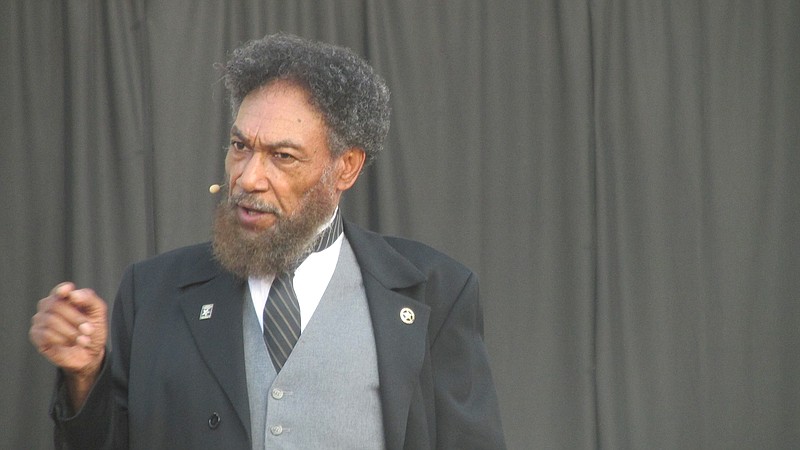Famous 19th century orator, writer and abolitionist Frederick Douglass comes alive on the Hempstead Hall stage Thursday courtesy of local performer Charles Everett Pace.
Starting at 7 p.m., Pace presents his one-man show "An Evening with Frederick Douglass." As a scholar, historic reenactor and member of the Great Plains Chautauqua Society, Pace delivers a 90-minute exploration of Douglass' life, including his struggles and accomplishments.
Douglass was born into slavery, but later as a free man he became a leading advocate for the abolition of slavery and for equality in many forms, also serving as an advisor to President Abraham Lincoln.
Pace says the roots of this show stretch back to his days as a college student, when he did a theater show about Douglass.
"This particular show actually grew out of a request that I received in 2009," he said. That was for the Lincoln Bicentennial Commission in Kentucky, a state where he taught.
For this celebration of Lincoln, Pace prepared a show that included both Douglass and Lincoln. He later transformed this into a one-person show that depicts the personal and political relationship between them during the Civil War era.
"This particular show is set in 1877, and President Rutherford B. Hayes has just been elected president and he has appointed Frederick Douglass to be the chief U.S. Marshal for the District of Columbia," Pace said. "So Douglass comes out and he starts to talk, and he reflects back on what got him to this point."
This incredible life story starts at the time Douglass was enslaved and then later, literally, ran from U.S. Marshals.
How did Douglass change, then, from the time of the Civil War, when Douglass was a vehement abolitionist urging Lincoln to act, to the time where Pace's presentation is set, about a dozen years later?
"Douglass moves principally from being a reformer to being a politician, to being able to appreciate Lincoln," Pace said. "Of course, he was critical of Lincoln initially because Lincoln was not an abolitionist. Lincoln was a colonizationalist." At the time of the Civil War, Douglass pressured Lincoln, however, to think differently.
And in the same way, Douglass saw his views about Lincoln change, once he himself entered politics. "He came to see that Lincoln was the perfect man for the time," said Pace about this solo performance and monologue. He explores some of Douglass' personal struggles, too, including how he learned to read and its connection to the idea of freedom.
Pace explains that the Chautauqua method strives to accomplish three things as a generally unscripted, three-part historical monologue.
"The first part is the text, the character. The second part are questions to the character. All answers must be historically correct based on primary source material," he said. "And then the third question-and-answer is to the scholar, who can answer questions that the character could not or maybe would not answer." This is the Chautauqua way.
This Black History Month performance is part of the Southwest Arkansas Arts Council's lineup of Hempstead County Bicentennial programs. In addition to Douglass, Pace has portrayed historic people like Malcolm X and W.E.B. DuBois. He has six characters in his repertoire.
In addition to his performing, Pace has taught at institutions like the University of Nebraska-Lincoln, Purdue University and Centre College. He graduated with degrees from the University of Texas-Austin and Purdue University. His work experience includes public diplomacy for the United States Information Agency in several African cities.
(Tickets: $10 for adults, $5 for students. Buy tickets and find more information online at HempsteadHall.com or call 870-722-8565.)

